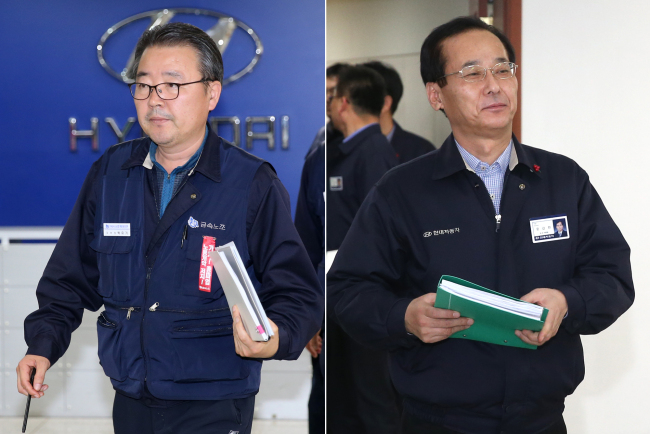After marathon 11-hour negotiations representatives of labor and the management of Hyundai Motor reached a tentative deal on wages Wednesday, ending months of internal conflicts that wobbled the nation’s largest automaker already facing lower-than-expected sales this year.
 |
Hyundai Motor president Yoon Gap-han (right) and labor union leader Park Yoo-ki leave after reaching a tentative agreement on wage and other labor issues in Ulsan, Thursday. (Yonhap) |
The two sides agreed to raise 85,000 won in base salary and 300 percent of the salary plus 2 million won in bonus payment. Workers will be also given a list of incentives for improving the product quality and their contribution in launching luxury sedans as well as 20 shares each in return for additional agreements.
On the management’s demand to adopt a wage peak system, the two sides agreed to slash 10 percent of salaries of workers aged 59 and 60, starting with those at the senior level first. The matter of introducing the system for the rest of the union members will be discussed at next year’s negotiations, they said.
The deal will be finalized after a vote by union members on Monday that requires approval from more than a half of its 49,000 members.
Expectation is high for the union’s approval as the deal was reached amid escalating concerns over the fate of the auto giant’s slumping sales as well as tough market conditions at home and abroad.
Industry watchers say that the two have shared the need to strike the deal within this year with both feeling pinched over growing uncertainty of the global economy after a Fed hike last week and slowing Chinese economy ― the carmaker’s major export destinations.
Sales have been falling in the face of fierce competition and the overall downturn in emerging markets. Analysts at Bloomberg also gave a bleak prospect that the carmaker won’t be able to reach its ambitious target of selling 8.2 million cars this year.
During the January-November period, Hyundai Motor sold a cumulative 3,816,908 units overseas, down 1.4 percent from a year earlier, according to company data. This gloomy outlook may have pushed the two to reach the deal, particularly the union ― notorious for its hard-line stance ― refraining from taking extreme actions anymore, they added.
The deal puts an end to a series of lengthy negotiations as well as three partial strikes in the last six months, clearing hurdles for the company before New Year begins.
Despite the optimism, the deal has left scope for more quarrels as they failed to resolve contentious issues on wage peak system and ordinary wages.
The two sides have been locking horns over the adoption of wage peak system as well as the level of ordinary salaries. But the deal was concluded without reaching agreements on the two sensitive matters.
The new wage system calls for workers to accept a salary cut in return for working until the retirement age set by the company. The system has been pushed by the government which believes that it would help companies create more jobs and alleviate high youth unemployment. The workers have also been demanding more basic wages as it determines overtime and severance payments, which is burdensome for the management.
By Cho Chung-un (
christory@heraldcorp.com)








